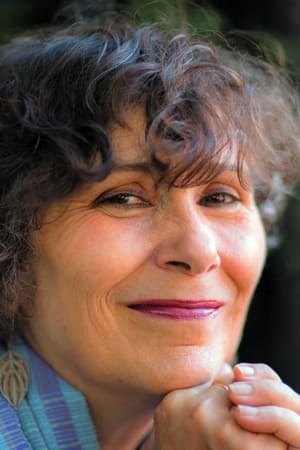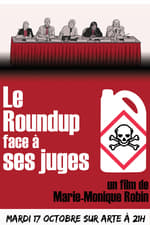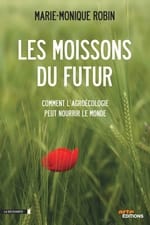Información personal
Conocido por Dirección
Créditos conocidos 13
Sexo Femenino
Fecha de nacimiento 15 de junio de 1960 (63 años)
Lugar de nacimiento Gourgé, Deux-Sèvres, France
También conocido como
- -
Puntuación del contenido
100
¡Sí! ¡Buena pinta!
Iniciar sesión para informar de un problema
Biografía
Marie-Monique Robin (born 15 June 1960, Poitou-Charentes) is a French TV journalist and documentary filmmaker. She generally issues books and documentary films together on the topics she investigates, in order to make more people aware of the issues she studies.
Her work has been recognized by numerous awards: the 1995 Albert Londres Prize for Voleurs d'yeux (1994), an exposé about organ theft; best political documentary award from the French Senate for Escadrons de la mort, l'école française (2003), her film about France's transfer of counter-insurgency techniques (including torture) to Argentina; and the Rachel Carson Prize for Le monde selon Monsanto (2008), her film on Monsanto and challenges to the environment from its products, including GMOs.
Marie-Monique Robin was born in 1960 and grew up in the Deux-Sèvres, where her parents were farmers. She studied political science at the University of Saarbrücken and graduated from university teaching journalism center of the University of Strasbourg.
After studying journalism in Strasbourg, she worked with France 3 for a time. Robin went to Nicaragua and worked in South America as a freelance reporter. She traveled to South America more than 80 times, including 30 times to Cuba. She reported on the Colombian guerrillas, and later worked for CAPA news agency.
Voleurs d'yeux (Eye Thieves), 1994, was the name of a book and a film based on it, related to her investigations of organ theft. After her film was shown at the United Nations, the USIA spokesman said that it was a lie. She was subjected to various pressures and personal attacks, but the following year in 1995, she was awarded the Albert-Londres prize for her film. However, the concession was suspended while the jury studied allegations of falsehoods after French physicians discovered that one of the children whose corneas the film said has been stolen still had them. After months of discussions, the commission decided to ratify the concession because they didn't find "bad faith".
Marie-Monique Robin subsequently left CAPA to work freelance. She is doing a report on Cuba for Thalassa, a French television program. Another project is exploring the rise in false allegations of pedophilia being made against teachers.
Robin made a 2003 film documentary titled Escadrons de la mort, l'école française (The Death Squads: The French School) that investigated the little-known ties between the French secret services and their Argentine and Chilean counterparts. (The next year she published a book on the same topic.) Specifically, she documented that the French transferred to Argentina counter-insurgency tactics which they had developed and used during the Algerian War (1954–62), including extensive use of torture and disappearances. The security forces later used them during the Dirty War (1976-1983) and for Operation Condor. She received an award in 2003 for the "best political documentary of the year" by the French Senate, in recognition of this work. Robin said in an August 2003 interview in L'Humanité: "[the] French have systematized a military technique in urban environment which would be copied and pasted to Latin American dictatorships". ...
Source: Article "Marie-Monique Robin" from Wikipedia in English, licensed under CC-BY-SA 3.0.
Marie-Monique Robin (born 15 June 1960, Poitou-Charentes) is a French TV journalist and documentary filmmaker. She generally issues books and documentary films together on the topics she investigates, in order to make more people aware of the issues she studies.
Her work has been recognized by numerous awards: the 1995 Albert Londres Prize for Voleurs d'yeux (1994), an exposé about organ theft; best political documentary award from the French Senate for Escadrons de la mort, l'école française (2003), her film about France's transfer of counter-insurgency techniques (including torture) to Argentina; and the Rachel Carson Prize for Le monde selon Monsanto (2008), her film on Monsanto and challenges to the environment from its products, including GMOs.
Marie-Monique Robin was born in 1960 and grew up in the Deux-Sèvres, where her parents were farmers. She studied political science at the University of Saarbrücken and graduated from university teaching journalism center of the University of Strasbourg.
After studying journalism in Strasbourg, she worked with France 3 for a time. Robin went to Nicaragua and worked in South America as a freelance reporter. She traveled to South America more than 80 times, including 30 times to Cuba. She reported on the Colombian guerrillas, and later worked for CAPA news agency.
Voleurs d'yeux (Eye Thieves), 1994, was the name of a book and a film based on it, related to her investigations of organ theft. After her film was shown at the United Nations, the USIA spokesman said that it was a lie. She was subjected to various pressures and personal attacks, but the following year in 1995, she was awarded the Albert-Londres prize for her film. However, the concession was suspended while the jury studied allegations of falsehoods after French physicians discovered that one of the children whose corneas the film said has been stolen still had them. After months of discussions, the commission decided to ratify the concession because they didn't find "bad faith".
Marie-Monique Robin subsequently left CAPA to work freelance. She is doing a report on Cuba for Thalassa, a French television program. Another project is exploring the rise in false allegations of pedophilia being made against teachers.
Robin made a 2003 film documentary titled Escadrons de la mort, l'école française (The Death Squads: The French School) that investigated the little-known ties between the French secret services and their Argentine and Chilean counterparts. (The next year she published a book on the same topic.) Specifically, she documented that the French transferred to Argentina counter-insurgency tactics which they had developed and used during the Algerian War (1954–62), including extensive use of torture and disappearances. The security forces later used them during the Dirty War (1976-1983) and for Operation Condor. She received an award in 2003 for the "best political documentary of the year" by the French Senate, in recognition of this work. Robin said in an August 2003 interview in L'Humanité: "[the] French have systematized a military technique in urban environment which would be copied and pasted to Latin American dictatorships". ...
Source: Article "Marie-Monique Robin" from Wikipedia in English, licensed under CC-BY-SA 3.0.
Dirección
|
||||||
|
||||||
|
||||||
|
||||||
|
||||||
|
||||||
|
||||||
|
||||||
|
||||||
|
||||||
|
Guion
|
||||||
|
||||||
|
||||||
|
||||||
|
||||||
|
||||||
|
Interpretación
|







